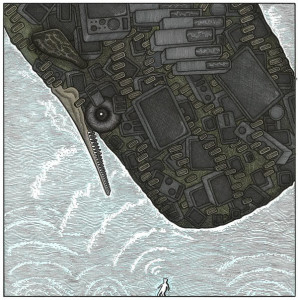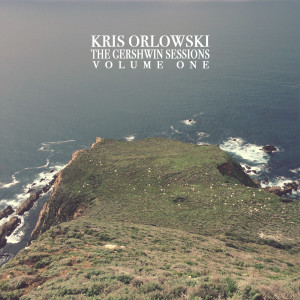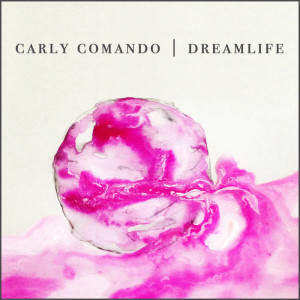Last updated on December 28, 2016

Louis Landry‘s JJ vs. the Digital Whale is, in a word, ambitious. The album re-situates the story of Jonah from “its roots in Christian, Jewish and Islamic culture” and comments on the “constant barrage of electronics, media, and technology which surround us all” by interpreting all of that as the whale. (The press also mentions Flaming Lips’ Yoshimi and Pink Floyd’s Animals as RIYLs.) So right off the bat, there’s points for conceptual boldness from this corner. The album that results is a largely major-key indie-rock festival that incorporates an incredible amount of sounds and instruments.
By pointing this out as a rock opera, it leaves the standard bounds of reception: JJ vs. The Digital Whale is held together by a repeated motif, the overarching story, and a spirit of adventure instead of any dedication to a stable genre. “Ride the Whale” has some Prince-ian funk going on; “Nothing No One Nowhere Blues” is a grumbling, stomping delta blues; “Ismi Azum” is a near-ambient instrumental rumination that fuses acoustic and electronic; “YOU’VE GOT eWHALE” is a marching, instrumental theatrical reminiscent of (yep!) Yoshimi. It wouldn’t be complete without a sea shanty, so “Ribs and Terrors” gives us a duet between a traditional accordion and a wiry synth before Landry’s voice comes in.
The remarkable thing about JJ is that even though the album has wide-ranging interests, the album never goes awry. Landry is able to corral all the sounds into the sonic framework he’s developed. Now, it’s weird, but it’s a rock opera about a modern re-telling of an ancient tale as understood by our current electronic issues. This never had a small horizon. By the time “Sunbound” rolls around, a six-minute slow-building acoustic-based indie-rock tune with a backing choir, nothing seems out of place at all. If you’ve got an adventurous streak and appreciate musicians with big ideas, then Louis Landry’s JJ vs. the Digital Whale will be right up your alley.
—

Kris Orlowski references Jonah as well in “It Ain’t Necessarily So,” the opener on The Gershwin Sessions Vol. 1. After that Porgy and Bess tune, folkie-turned-indie-pop/indie-rock musician Orlowski focuses his attention on Gershwin’s love songs in this loving tribute to the early 1900s songwriter best known for Rhapsody in Blue.
The six-song collection treats these tunes with piety, largely retaining their form, structure and vibe (particularly in the strings). The update lies in Orlowski’s voice and delivery, as well as the inclusion of guitar in the largely piano-driven originals. Orlowski’s confident tenor gives a warm sheen to these tunes, and the guitar contributes a modern vibe that pushes against the romantic strings in a productive tension. Those smart touches combine with the rest of the arrangements to create tunes that are both clever and honest: the material never strays too far from the source, but these songs feel differentiated enough to justify their existence. The biggest difference comes in closer “Things Are Looking Up,” which features a much sparser arrangement than the rest. The subtle motion of a gentle electric guitar strum and the engineering of the bass push this in a more modern pop direction, which is just lovely. Elsewhere, “Love Walked In” and “Nice Work If You Can Get It” are particularly neat. If you’re a fan of the old and the new, Orlowski has implicitly promised more than one collection of this work–get excited.
—

Carly Comando‘s Dreamlife has two settings: slow and fast. The instrumental pianist best known for the deeply moving “Everyday” offers tunes that have rushes of single-note runs, rapid patterning, and arpeggiation (“Daydream,” “Dragonfly”) alongside those that go for the more stately emotions (“Procession,” “Birthday”).
The former are charged with excitement and passion, as they sound like running, leaping, and playing. The more solemn tunes are less immediate, as they are less similar to pop songs and more like classical compositions. The best side of her work comes out when both the gravitas and the enthusiasm come out at once, as in the middle of “Daydream” and the entirety of “Dusk.” Comando augments fluttering synth patterns with a heavy left hand on the bass piano keys to create a unique tension. The song builds and flows with the two vibes working together to create something larger than both. It’s in that melding that Carly Comando’s unique strengths as a composer are shown. This is beautiful, evocative, powerful music–you’ll be hearing this in places you don’t expect for years to come, so jump on it now and have the surge of recognition at movie trailers and advertisements of the future.